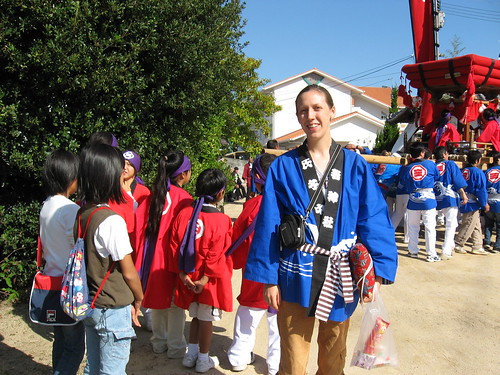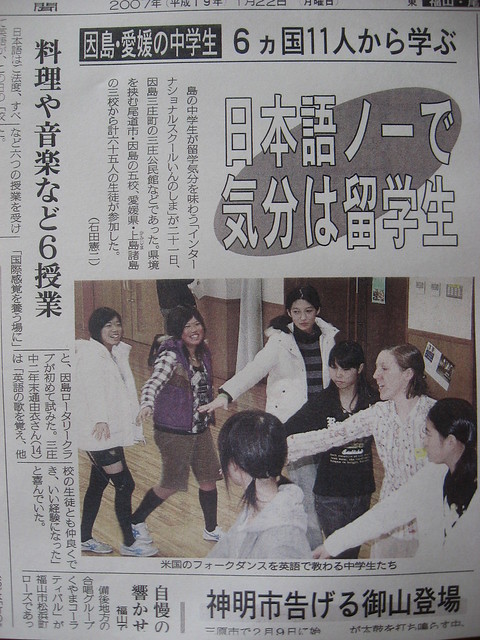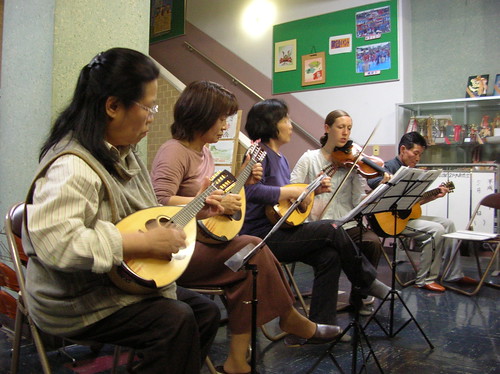What’s your name, when and where was your placement, and where are you from originally?
I’m Jennie Terman, originally from “almost heaven” West Virginia in the USA. When I applied for the JET program, I had requested to work on a remote island, and I got what I asked for! From 2006 – 2008, I lived on a small island in the Inland Sea called Yuge. It could only be accessed by ferry (not sure if they’ve built a bridge since my time there), and the population was a couple thousand. I taught English in all the schools on the island and for all ages, including kindergarten, elementary, junior high, and high school, as well as adult English conversation classes. The junior high school was my favorite, partly because of the amazing teacher with whom I co-taught (we’re still friends 15 years later!) and the amazing group of kids. There were only about 50 students at the junior high school, and some of the grades only had 12 students, so I was really able to get to know them. The school was literally built right on the Inland Sea!
How did you find out about JET, and what led you to apply?
I’ve been an enthusiast of Japan ever since I watched “Big Bird Goes to Japan” when I was very young. I was lucky enough to take an after school Japanese language and culture class in elementary school and got scholarships to do a summer exchange program in high school and a full year study abroad in college. I first learned about the JET program through my Japanese teacher when I started studying the language seriously in high school, and it was like my whole life had been leading me to do it!
What did you hope to achieve during your time on JET, and did that change over time?
I wanted to be a really good teacher, give my students a unique perspective of American culture, and improve my Japanese language skills. In college, I minored in teaching English as a second language, and I had thought that I would make that a life-long career either abroad or back in the U.S., so I wanted to treat the JET program as an entry to that career. However, over the course of the two years that I taught in Japan, I began to realize that I was much more interested in teaching my students about American cultural traditions, and especially music, than English grammar. I play fiddle music common in the Appalachian Mountains of my West Virginia home, and I brought my fiddle with me to Japan to teach my students about that music and other American musical traditions.
What is your lasting impression of the work you did on JET and the communities you were part of?
Some of the best memories I have of my time on Yuge are playing music with my students and the community. It was a way to connect with the community that didn’t require fluency in either Japanese or English. Of course, the fact that I am from West Virginia, and John Denver’s “Take Me Home, Country Roads” is known the world over helped to break the ice (and provided endless karaoke entertainment). Additionally, I regularly brought my fiddle to classes for all age groups and taught my students the lyrics to traditional Appalachian songs. I also taught a square dance class and a jug band class as part of an annual international school day event on a neighboring island. One of my students who was very interested in learning English but had a shy personality connected with me over our shared passion for music, and we rehearsed and performed duets on violin and piano. I regularly attended my junior high school’s music class, joined an evening mandolin ensemble, sang in the community choir, and took shamisen lessons from an 84-year old woman. The two years on Yuge turned into a musical exchange that I will never forget and that was formative for the career path I’ve taken.
Where did JET lead you?
While I was in Japan and enjoying teaching about musical traditions from my home and learning about musical traditions from Japan, I decided I wanted to go to graduate school back in the USA to study ethnomusicology (a combination of anthropology and music studies) and dedicate myself to facilitating cross-cultural understanding through music. And I did just that!
One of the biggest concerns for JETs is what they are going to do when they finish JET. Did your plans for after JET change during your time on JET, and if so, how?
As I described above, I thought the JET program would be the beginning of my career in teaching English to speakers of other languages (and I’m still keeping that in my back pocket as an alternative career plan!). But instead, I decided to go to graduate school to study ethnomusicology. I still wanted to facilitate cross-cultural exchange and understanding, but I decided I wanted to do that through music.
What did you end up doing immediately after your time on JET?
I’m the sort of person who always has a 4-5 year plan in mind. I wasn’t immediately ready to go to graduate school upon my return to the USA, but wanted to study some and work some in preparation for grad school. Immediately upon my return to the USA, I moved in with my sister and her fiancée (only for about 4 months!) and took a music theory class and Appalachian music class at the local university. My undergraduate degree is in anthropology, so I thought I needed some more formal education in music before applying for an ethnomusicology grad program. It was also really great to have my sister and her fiancée as a support network (and place to live!) when I returned.
I then took a job through AmeriCorps, a US government program that places participants in economically depressed areas to serve the community in various ways (kind of like Peace Corps but in the USA). My job was to increase access to the arts at a historical theater in a very rural and mountainous area of West Virginia. I helped organize the annual performance series, developed community arts programming, raised funds, and applied for grants. I led a regular mountain music jam there, brought a taiko group in to provide workshops to the local kids, and went on tour with a Japanese bunraku puppet show in rural communities throughout the state of West Virginia. It was an amazing continuation of the cultural exchange I had started facilitating in Japan, and for anyone returning to the USA, I would highly recommend looking at options with AmeriCorps!
I eventually did go to graduate school (three years after my return from Japan) and got a degree in ethnomusicology. These experiences led me to my current job working for the US government at the National Endowment for the Arts where I manage grant applications for nonprofit arts programs across the country.
For JETs currently working out what they want to do when they finish, what advice would you give them?
Create a 4-5 year plan! Or even a 2-3 year plan. What have you learned about yourself while participating in the JET program? What are your priorities now? What are you passionate about? Can those priorities and passions become a career or even just a stepping stone to a career? Do you need/want more formal education, or are you more interested in learning through doing/working (or both!)? Think about your options, take some time while in Japan to research your options, and have a plan to pursue your chosen path after JET, even if that plan is to take more time to figure out what you want to do. Make sure you have a support network (family and/or friends) when you return. You’ll need some time and help settling back in to what will now seem almost like a foreign culture. You probably will experience reverse culture shock at some level. I remember having anxiety about making and receiving phone calls; it was like I completely forgot how to do it in the US! Culture shock manifests in the strangest ways, so try to be self aware and take care of your mental health.
One regret I have (in life in general) is waiting too long to start a family. I was always encouraged to focus on my career path, and even though I knew I wanted to have kids someday, I spent too much time solely focused on my career and didn’t plan well when it came to starting a family. It ended up being very difficult because I started too late. I’m lucky now to have a loving partner and kid, but it was a difficult path. So, if you know you want to have a family some day, my advice would be to consider that in addition to your career plans. Not to put too much pressure on you now, but this is advice I wish someone had given me! Oh, and in addition to making all these plans, remember to appreciate and cherish the present!















Leave a Reply